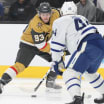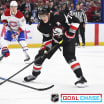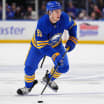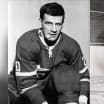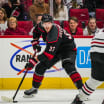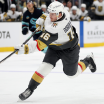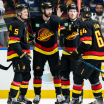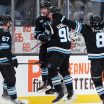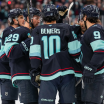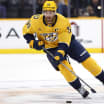When Team Canada picked captains for the World Cup of Hockey 2016 in Toronto, it selected the same group it had at the 2014 Sochi Olympics: Sidney Crosby will wear the "C." Jonathan Toews and Shea Weber will be the alternates.
When it needed to replace left-shot defenseman Duncan Keith because of injury, it picked a left-shot defenseman, Jay Bouwmeester, who played in Sochi over left-shot defensemen like Mark Giordano.
It's easy to understand why. Not only did Canada win its second straight Olympic gold medal in Sochi, it dominated. In six games, it never trailed, let alone lost, allowing three goals in the tournament -- zero in the semifinal and final.
World Cup presents new challenges for Mike Babcock
Team Canada coach hopes roster can mesh quickly in pursuit of more gold
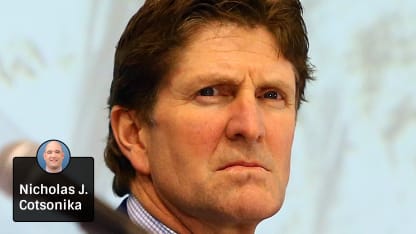
© Getty Images
"Obviously, we had great success there," Team Canada general manager Doug Armstrong said Thursday.
Mike Babcock is back for his third straight best-on-best tournament as Team Canada coach, and speaking of the captains, he said: "They know me. I know them. They know what's expected."
But that does not mean Canada expects this World Cup to be just like the last Olympics. This is a different tournament with a different format, a different ice surface and different rules. Team Canada will play a different system with a different roster.
Originally, 14 members of this team had played in Sochi. But when Team Canada had to replace forward Jamie Benn because of injury, it picked Logan Couture, who has never represented Canada in a best-on-best-tournament before. So now 13 members of this team played in Sochi, which means 10 -- almost half the roster -- did not.
"What won in 2014 isn't going to win this time," Babcock said on the call.
In Sochi, Canada had more talent and depth than any other nation and used it to its advantage by rolling four lines, taking quick shifts and pushing the pace. It had the puck most of the time, and when it didn't, it came back hard to get it again.
Shutting down superstars wasn't enough to beat Canada. Opponents had to keep up, get the puck somehow, break their structure and cash in on opportunities. No one could do it.
In Toronto, Canada will have the same general idea.
"Obviously, we want to play fast, we want to spend no time in our zone, and we want to come at you in waves," Babcock told NHL.com in early August. "We want to have the puck all the time."
The difference will be in the details.
The Sochi Olympics were played on the larger international ice sheet. So Canada hired consultant Ralph Krueger, a Canadian with NHL and international coaching experience who is now coaching Team Europe, comprised of the best players outside of the Czech Republic, Finland, Sweden and Russia. Krueger briefed Babcock on tactics his opponents would use, like staying back, clogging the middle and keeping the puck to the outside.
Canada held an Olympic orientation camp in Calgary in August 2013. The players couldn't skate because of insurance costs, so Babcock had them play ball hockey to walk through systems. He warned them some of the games might be tight and not to get frustrated if they didn't score as often as they expected.
Sochi played out much like Babcock had told them it would. Before going out for the third period in the gold medal game against Sweden, center Ryan Getzlaf even teased Babcock and reinforced his lessons by shouting: "It's all about the ball hockey, guys! It's all about the ball hockey!"
The World Cup will be on NHL ice at Air Canada Centre, under NHL rules and with NHL officiating. An even greater percentage of the players will be NHL players. So expect mostly the latest NHL tactics.
Babcock said Thursday the NHL game has gotten tighter as the players have gotten bigger and faster and the goaltenders have gotten bigger and better. There's no room in the neutral zone, no room in the defensive zone, no room in the net, so you have to create space and make plays in tight areas.
"Each tournament's new," Babcock said earlier this month. "I think what's real important is, you're always evolving your game. You're trying to figure out what wins. So Pittsburgh won [the Stanley Cup]. Well, why did they win? You've got to evaluate that. San Jose had a great year. Why did they have a great year?
"So what you're trying to do is make sure that you're giving your players the best opportunity to have success by making sure you do all your homework. You know, I'm real confident in our coaching staff and our management team that we put a lot of work in, and that work will show when it's time to play."
Each team has two weeks of training camp, including three pre-tournament games and three preliminary games. The top two teams in each four-team group make the single-elimination semifinals. The final is best-of-3.
Each coach must get his talent on the same page and some stars to accept different roles than they're used to, and he has to do it quickly.
Starting with the opening of camp Sept. 5 in Ottawa, Babcock will try to bring together the players who were in Sochi and those who weren't. He will try to orchestrate another relentless, bloodless performance but with an NHL style in an NHL setting.
"You prepare your team as best you possibly can, and then you see what happens through the exhibition and you're just going to keep evolving as it goes on," Babcock said in early August. "I just think in all these events, if you're going win in the end, you've got to get better every day. …
"You want to be one of those teams that gets to play in the final three. In order to do that, you've got to get better every day of the tournament. So that's the challenge for us."
